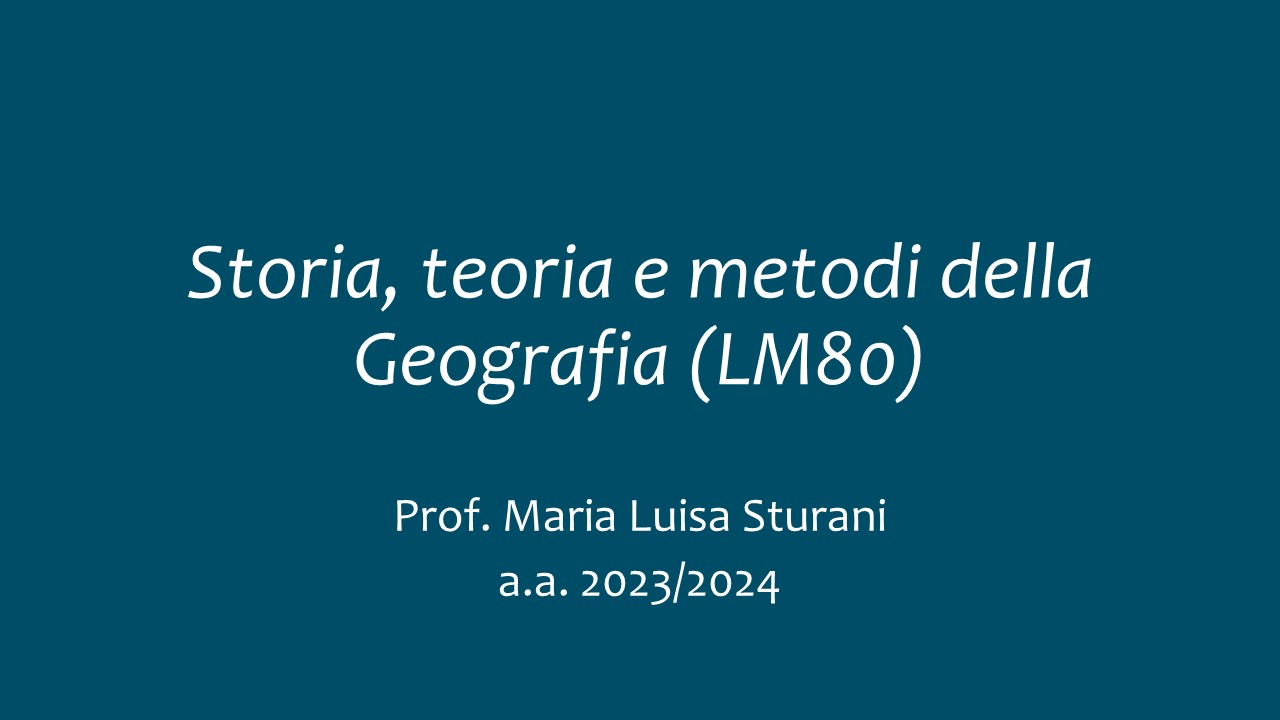
Syllabus
Contents
The concepts of 'city' and 'region' have longtime played a central role in geographical discourses, especially concerning the spatial aspects of economic development, political structures, and society.
In conventional analytical schemes, each geographical region is 'contained' in a pertinent territorial scale, including other geographically 'smaller' scales- e.g. the urban one - and it is 'contained' in superior scales - national and global ones. The complex integration between local and global, induced by the enlargement of economic relationships, market integration, and intercultural dynamism, undermines this mechanical vision of the relationships between territorial structures and scales.
After providing the students with some basic definitions concerning the different kinds of 'urban' and 'region' and the primary keys for analysing the re-scaling and urbanization processes engendered by globalization, the course will focus on the following aspects:
1) the mutual relationships between globalization and spatial structures;
2) the development/underdevelopment processes;
3) the 'regional Renaissance' and the recent resurgence of the economic and political competition between regions and 'post-national' states;
4) the ongoing processes of planetary urbanisation
Structure of the course
- Three thematic sections: face-to-face lessons+ readings;
- At the end of each section, a recap seminar in which students should discuss the main themes, also about contemporary issues; students should read all the papers suggested and actively take part in the seminars; participation in the three seminars is mandatory for the attendees and will be evaluated and count for the 30% of the final grade;
- at the end of the course, students are expected to produce a written text on one of the themes explored within the course: the essay should be 1500/2000 words long and will count for 70% of the final grade
Learning outcomes
1) Knowledge and understanding ability.
Students should acquire the key concepts of the regional geographical analysis:
1) the different definitions of the 'urban' and 'region';
2) the regional imbalances and the related theoretical explanations;
3) the relationships between urban and regional theories/representations and the intervention tools for socio-economic development;
4) the 'artificial' nature of territorial boundaries and the role of regions as both spaces for policies and actors of policies.
2) Capability to apply knowledge and understanding
Students should be able to interpret the development/underdevelopment processes by applying the conceptual categories learned in class, identifying the territorial dynamics drivers as the first elements of assessment for defining consistent territorial policies.
3) Capability to develop a critical approach to spatial issues
Students should be requested to do in-depths about specific topics to assess their capability of autonomous elaboration.
4) Communication abilities
Students should manage the technical language and be able to present the core elements of the discipline clearly and maturely. Further personal in-depths will be discussed in devoted seminars, in which students should publicly show their communication abilities.
5) Learning ability
Students should be able to interpret the economic processes unfolding within the territorial dimension, taking into consideration the different institutional, social, and material factors affecting the levels of development
- Teacher: SaloneCarlo

The course offers an introduction to critical geographical thinking, with particular reference to how it developed in the past decades in Anglophone Geography. The aim is to provide a concise, yet rich, introduction to a number of key concerns related to the critical understanding of space, place, scale and related processes. Key notions and approaches derived from political economy, relational spatial thinking, critical gender and race studies, political ecology will be presented and discussed. The course mixes frontal lectures with moments of in-depth reading of academic texts, as well as discussion of contemporary societal issues at the global scale. The final part of the module provides a glance at some of the most common qualitative research methods in Human Geography, analysing their ethical implications and the role of Academics (including students) in the (re)production of unjust spaces.
- Teacher: LancioneMichele

The course explores key issues and debates in the field of urban studies. It is organised in two sections, which develop in parallel. The first ("encyclopedic") section analyses some key concepts which are crucial for a deep understanding of contemporary cities (e.g. diversity, conflicts, neoliberalism, right to the city, gentrification, urban governance, urban geopolitics). The second ("monographic") section critically investigates different types of self-organization in the residential field (e.g. gated communities, cohousing, squatting, housing self-construction, informal settlements).
- Teacher: ChiodelliFrancesco
